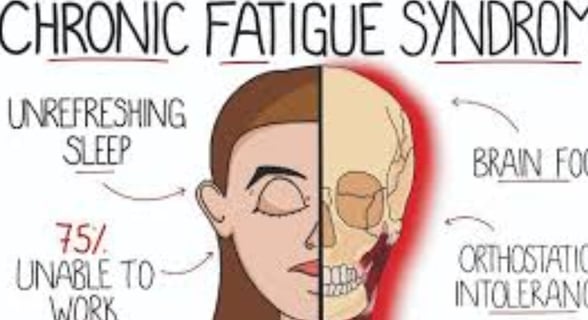
Health is a crown on the heads of the healthy that only the sick can see.

chronic fatigue syndrome fasting & cold water therapy benefits
Explore how fasting and cold water therapy can help manage chronic fatigue syndrome (CFS) and myalgic encephalomyelitis (ME). Discover insights on severe fatigue, brain fog, and the role of immune dysfunction in these conditions.
GENERAL
Dr Hassan Al Warraqi
1/22/2025


Chronic Fatigue Syndrome: Fasting & Cold Water Therapy
Chronic Fatigue Syndrome (CFS) / Myalgic Encephalomyelitis (ME) Voluntary Fasting and Cold Water Therapy
Chronic Fatigue Syndrome (CFS), also known as Myalgic Encephalomyelitis (ME), is a complex medical condition characterized by severe and persistent fatigue that does not improve with rest.
Symptoms often worsen with physical or mental activity, significantly impacting the quality of life for those affected.
Other symptoms include:
Brain Fog: Difficulty concentrating and memory problems.
Sleep Disorders: Such as insomnia or unrefreshing sleep.
Muscle and Joint Pain: Without obvious inflammation.
Headaches: Especially if they are new or more severe than usual.
Flu-Like Symptoms: Such as sore throat and swollen lymph nodes.
The exact cause of the condition is unknown, but the following factors are believed to play a role:
Viral Infections: Such as Epstein-Barr virus.
Immune System Dysfunction.
Psychological and Social Factors: Such as chronic stress.
Genetic Factors.
The Role of Voluntary Fasting in Managing Chronic Fatigue Syndrome
Voluntary fasting, such as intermittent fasting, may have some potential benefits for individuals with Chronic Fatigue Syndrome.
However, it should be approached cautiously and under medical supervision.
Potential Benefits:
Improving Mitochondrial Function: Fasting may stimulate autophagy, a cellular cleaning process that helps repair damaged cells, potentially improving the function of mitochondria (the cell's energy centers).
Reducing Inflammation: Fasting may help reduce chronic inflammation, which is believed to exacerbate CFS symptoms.
Improving Insulin Sensitivity: Intermittent fasting may enhance blood sugar regulation, potentially reducing energy fluctuations.
Challenges and Risks:
Energy Depletion: Fasting may worsen fatigue in some patients, especially if the body does not handle calorie restriction well.
Symptom Exacerbation: Some patients may experience worsening symptoms such as dizziness or headaches during fasting.
Tips for Voluntary Fasting:
Consult your doctor before starting.
Begin with short fasting periods (e.g., 12-14 hours) and monitor how your symptoms respond.
Ensure adequate hydration and consume nutritious meals after fasting.
The Role of Cold Water Therapy in Managing Chronic Fatigue Syndrome
Exposure to cold water, such as cold showers or cryotherapy, may offer some potential benefits. However, it should be approached cautiously, as the body in CFS can be highly sensitive.
Potential Benefits:
Improving Circulation: Cold water may stimulate blood flow, potentially reducing muscle pain and boosting energy.
Reducing Inflammation: Cold exposure may help reduce chronic inflammation.
Stimulating the Nervous System: Cold water may activate the sympathetic nervous system, enhancing alertness and energy.
Improving Mood: Cold water may trigger the release of endorphins, improving mood and reducing feelings of fatigue.
Challenges and Risks:
Shock to the Body: Sudden exposure to cold water may cause shock, especially in individuals with heightened sensitivity or weakened immune systems.
Symptom Exacerbation: Some patients may experience worsened symptoms such as fatigue or pain after cold exposure.
Tips for Using Cold Water Therapy:
Start with short exposures (e.g., 30 seconds) and gradually increase duration.
Avoid cold water if you feel weak or excessively fatigued.
Consult your doctor before trying cryotherapy or cold showers.
Summary
Voluntary Fasting and Cold Water Therapy may be beneficial for some individuals with Chronic Fatigue Syndrome, but they are not comprehensive treatments.
These practices should be applied cautiously and under medical supervision, especially in CFS, where the body is highly sensitive.
A balanced diet, stress management, and medically recommended treatments remain the foundation for managing this condition.
If you are considering trying any of these approaches, discuss them with your doctor or healthcare provider to determine if they are suitable for your condition.
Frequently Asked Questions About Chronic Fatigue Syndrome and Treatment with Fasting and Cold Water Therapy
Q1: What is Chronic Fatigue Syndrome (CFS)?
A: Chronic Fatigue Syndrome (CFS), also known as Myalgic Encephalomyelitis (ME), is a complex medical condition characterized by severe and persistent fatigue that does not improve with rest.
Symptoms often worsen with physical or mental activity, significantly impacting the quality of life for those affected.
Other symptoms include:
Brain Fog: Difficulty concentrating and memory problems.
Sleep Disorders: Such as insomnia or unrefreshing sleep.
Muscle and Joint Pain: Without obvious inflammation.
Headaches: Especially if they are new or more severe than usual.
Flu-Like Symptoms: Such as sore throat and swollen lymph nodes.
Q2: What are the causes of Chronic Fatigue Syndrome?
A: The exact cause of CFS is unknown, but the following factors are believed to play a role:
Viral Infections: Such as Epstein-Barr virus.
Immune System Dysfunction.
Psychological and Social Factors: Such as chronic stress.
Genetic Factors.
Q3: What is the role of fasting in managing Chronic Fatigue Syndrome?
A: Voluntary fasting, such as intermittent fasting, may have some potential benefits for individuals with CFS.
However, it should be approached cautiously and under medical supervision.
Q4: What are the potential benefits of fasting for Chronic Fatigue Syndrome?
A: Potential benefits include:
Improving Mitochondrial Function: Fasting may stimulate autophagy, a cellular cleaning process that helps repair damaged cells, potentially improving the function of mitochondria (the cell's energy centers).
Reducing Inflammation: Fasting may help reduce chronic inflammation, which is believed to exacerbate CFS symptoms.
Improving Insulin Sensitivity: Intermittent fasting may enhance blood sugar regulation, potentially reducing energy fluctuations.
Q5: What are the risks of fasting for CFS patients?
A: Challenges and risks include:
Energy Depletion: Fasting may worsen fatigue in some patients, especially if the body does not handle calorie restriction well.
Symptom Exacerbation: Some patients may experience worsening symptoms such as dizziness or headaches during fasting.
Q6: What is the role of cold water therapy in managing Chronic Fatigue Syndrome?
A: Exposure to cold water, such as cold showers or cryotherapy, may offer some potential benefits.
However, it should be approached cautiously, as the body in CFS can be highly sensitive.
Q7: What are the potential benefits of cold water therapy for Chronic Fatigue Syndrome?
A: Potential benefits include:
Improving Circulation: Cold water may stimulate blood flow, potentially reducing muscle pain and boosting energy.
Reducing Inflammation: Cold exposure may help reduce chronic inflammation.
Stimulating the Nervous System: Cold water may activate the sympathetic nervous system, enhancing alertness and energy.
Improving Mood: Cold water may trigger the release of endorphins, improving mood and reducing feelings of fatigue.
Q8: What are the risks of cold water therapy for CFS patients?
A: Challenges and risks include:
Shock to the Body: Sudden exposure to cold water may cause shock, especially in individuals with heightened sensitivity or weakened immune systems.
Symptom Exacerbation: Some patients may experience worsened symptoms such as fatigue or pain after cold exposure.
If you are considering trying fasting or cold water therapy, consult your doctor or healthcare provider to determine if these approaches are suitable for your condition.
Keywords:
Chronic Fatigue Syndrome (CFS), Myalgic Encephalomyelitis (ME), severe fatigue, brain fog, sleep disorders, muscle pain, inflammation, viral infections, immune dysfunction, voluntary fasting, intermittent fasting, autophagy, cold water therapy,










